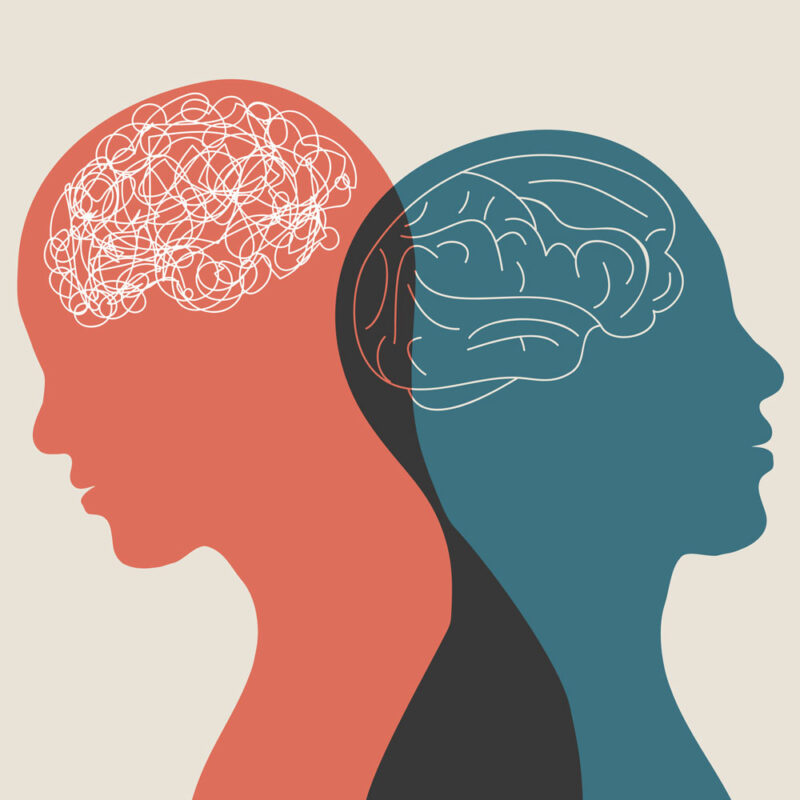By Anna McKenzie
Because mental health conditions affect how we think and feel, it can be difficult to recognize when we’re experiencing them. For some, it takes months or years of symptoms to realize that they are unwell. For others, symptoms affect the part of the brain that assesses self-image, creating a disparity that causes them to deny symptoms of a mental illness. It’s important to understand the symptoms of mental health conditions and addiction so that you can know when and how to seek help.
Because mental health conditions affect how we think and feel, it can be difficult to recognize when we’re experiencing them.
Getting a Mental Health Checkup
Mental health symptoms have a way of sneaking up on us. Depression may roll in like a fog over several days or weeks. Anxiety may grow steadily worse without any significant symptoms until a panic attack occurs. Having regular mental health checkups can help you detect symptoms before a condition reaches a crisis point.
During a mental health checkup, you want to ask yourself these questions:
- Have I been experiencing difficulty sleeping, eating, or thinking clearly? (If so, how long have these issues continued, and how severe are they?)
- Am I having intrusive or persistently negative thoughts?
- Am I having thoughts of harming myself or even suicide?
- Have I had any major ups and downs? (If so, what caused them?)
- Have the people in my life said anything about changes in my behavior?
- Do I feel like people are out to get me or can’t be trusted?
- Have I been isolating myself? (If so, for what reason?)
- Have I lost interest in things I once enjoyed?
- Am I obsessed with or hung up on an issue that I can’t resolve on my own?
- Is there anything I can do today that would help me feel better?
When you habitually ask yourself these questions, you’ll learn how to ask for help when you need it. Getting a loved one to answer these questions for you can also be extremely useful. Friends and family members can point out things that you may not be noticing about your own mental or emotional state, and they can even help you create a plan for improving your wellness. The National Institute of Mental Health (NIMH) has suggestions for what to do when you’ve been experiencing certain mental health symptoms. To screen yourself for a particular mental health issue, you can take an assessment offered by Mental Health America (MHA).
Friends and family members can point out things that you may not be noticing about your own mental or emotional state, and they can even help you create a plan for improving your wellness.
How to Know When You Need Mental Health Help
If you find that you’re experiencing strong mental health symptoms for more than two weeks, especially if they’re disrupting your life, it’s time to find a counselor or treatment professional who can talk with you about your options. Sometimes we simply adjust to our symptoms or attribute issues to bad luck or circumstances when the reality is that we need help to function well again. Restoring your mental health can improve every other area of your life!

In some instances, the reality that we have a mental health condition is hidden from us due to the nature of the disease. The National Alliance on Mental Illness (NAMI) explains that a condition called “anosognosia” can prevent some people from recognizing symptoms of mental health issues. Because of the area of the brain that some conditions affect, 30% of people with schizophrenia and 20% of people with bipolar disorder experience a critical lack of awareness about their mental health conditions. This is another reason why it’s important to connect with trusted loved ones or a counselor about your behavior, thoughts, and feelings. They can help you know when you need mental health help.
Signs That You May Need Help with Addiction
Addiction can easily begin because of our desire to mitigate mental health symptoms. We want to self-medicate our symptoms with behaviors or substances that ultimately become a problem themselves.
What are some signs that you may need help with addiction? Addiction is characterized by a lack of control. Here are several ways to know when it’s time to seek help for addiction:
- You continue to pursue a substance or behavior impulsively, in spite of negative consequences.
- You may want to stop, but feel unable to.
- In the absence of the behavior or substance, you experience withdrawal symptoms that impair your ability to function.
- You experience depression, anxiety, or paranoia on a more regular basis, especially when you can’t engage in your behavior or substance use.
- You start isolating yourself and try to hide your behavior or substance use from others.
- You find yourself lying or stealing in order to engage in your behavior or substance use.
Addiction can take your time, energy, money, work, health, and relationships. If you feel like your behavior or substance use is constantly on your mind and increasingly difficult to control, it’s time to seek help from treatment professionals.
Mental Health Treatment at The Meadows Texas
If you or a loved one is experiencing severe mental health symptoms or addiction, we can help. At The Meadows Texas, we employ a scientific approach to treating addiction and mental health issues that is evidence-based and backed by decades of clinical research. We utilize innovative techniques at our Brain Center to help patients understand their conditions in real time and learn how to restore their wellness. Our compassionate staff are ready to listen and assess your needs. Contact us today to learn more.

